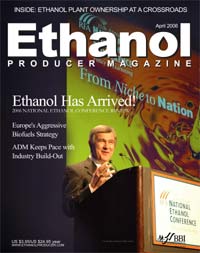April 2006
 View Full Print Edition
View Full Print EditionBusiness Briefs
Columns

A View from the Hill
By Bob Dineen

The Way I See It
By Mike Bryan
Legal Perspective
By Mark Hanson and Todd Guerrero
editor's note
By Tom Bryan
talking point
By Nathan Burk
NBB In Sight
By Scott Hughes
Featured

Ethanol Has Arrived
By Jessica Williams and Tom Bryan
The 2006 National Ethanol Conference: Policy & Marketing, the ethanol industry's premier winter event, was sold out and buzzing with energy this year as the industry's extraordinary expansion seems to intensify by the day. The Renewable Fuels Association's 11th annual conference marked not only the celebration landmark policy achievements in 2005, but the trade group's own 25-year anniversary.

Holding Its Lead
By Ron Kotrba and Tom Bryan
ADM's presence in the marketplace is undeniably commanding, yet its capacity to produce ethanol today represents just a quarter of the burgeoning U.S. market. Still, the corporation's mission to "unlock the potential of nature" and "improve the quality of life" is consistent with the aspirations of American farmers and entrepreneurs driving the expansion of today's ethanol industry. For that reason alone, expect ADM—a century-old innovator with a long-term approach to business—to keep pace with the industry it established.
Ownership at a Crossroads
By Nicholas Zeman
Is the U.S. ethanol industry's connection to value-added agriculture—and the predominantly rural Corn Belt communities that support and benefit from production—diminishing? Or, as non-farm interests take hold of a greater fraction of the nation's ethanol market, are investment opportunities for farmer cooperatives and independent growers simply changing with the times?

Europe's Bold New Strategy
By Holly Jessen and Anduin Kirkbride McElroy
In the face of rising oil prices and growingly volatile trade relations with developing nations, the European Union has established a new set of priorities to bolster its economy, secure its future fuel supplies, support agriculture and curb climate change. Despite Europe's predisposition toward diesel power, experts say its fledgling ethanol industry is poised for sheer growth—and a fresh EU Biofuels Strategy supports that notion.
Time To Sync Things Up
By Anduin Kirkbride McElroy
Despite Minnesota's bumpy start with B2, several states are pushing for similar low-blend biodiesel requirements this legislative season. With everything on track-and on spec-in the Land of 10,000 Lakes, the focus of industry leaders has shifted to discouraging inconsistent biodiesel requirements and incentives among states. Nationwide coordination has become an instant necessity.
Pure Green Power
By Nicholas Zeman
As the first utility company in the United States to use B100 in a stationary power generation application, McMinnville Electric in Tennessee has experienced trials, tribulations and, by most measures, good success in its progressive experiment to produce green electricity from a clean and renewable domestic fuel.
Seeing the Future in a Week's Time
By Ron Kotrba
It's generally accepted that biodiesel blends, while reducing almost all harmful diesel vehicle emissions, lead to slightly higher levels of NOx. Now, a breakthrough study-the Weekend Ozone Effect-has government scientists, policy enforcers and biofuels advocates abuzz over data indicating that less NOx is precisely what's not needed to control the formation of ground-level ozone in urban areas.
Mile-High Quality
By Dave Nilles
As the biodiesel industry continues to explode throughout the soy-oil-rich Midwest, some plant developers are considering a different approach. Producing high-quality biodiesel near high-demand metro areas continues to be the game plan for BioEnergy of Colorado
A Real Biodiesel Insider
By Holly Jessen
Contributions
New Issues Arise as the Size of Ethanol Plants Increase
By Todd Alexander and Marissa Leigh Alcala
EPA Announces Proposed Changes to Ethanol Plant Air Permitting
By Howard Gebhart

Denatured Ethanol Analysis
By Dr. Jerry King



